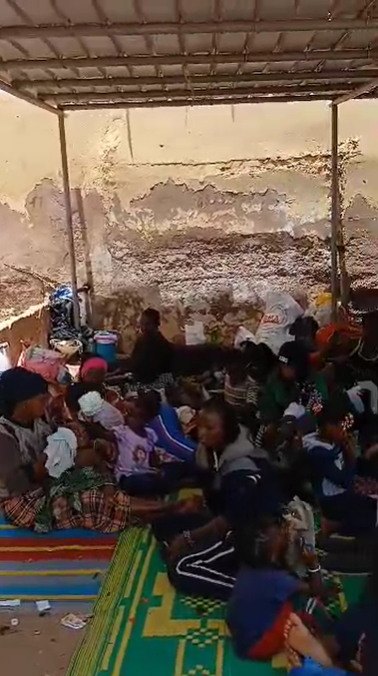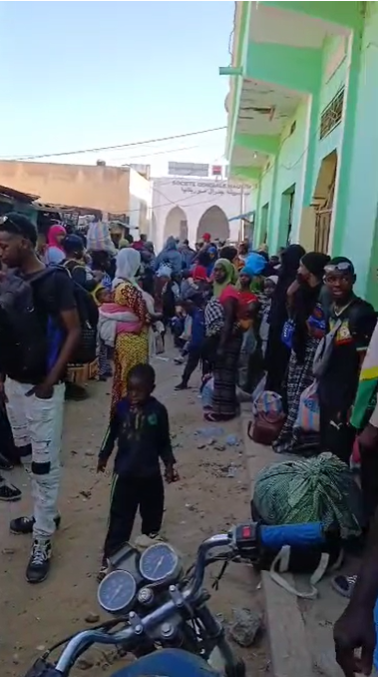Several weeks after the start of the Mauritanian authorities' migrant deportation campaign, hundreds of migrants find themselves stranded in Rosso, a cross-border town between Mauritania and Senegal. This influx is making the humanitarian situation difficult in the region.
"The police arrested us on our way to work. I don't have the means to return home. I also don't have money to eat or buy medicine; I don't know what to do." In a video sent to InfoMigrants, a Nigerian migrant described his distress after being arrested in Mauritania and then sent to the border with Senegal, in Rosso. His body was covered with what appeared to be injuries.
Since the beginning of the year, such accounts have multiplied. "They beat us and took us to prison without saying a word" and "took everything we owned: money, watches, phones," Ismaïla told AFP after his arrest by Mauritanian police. "They (then) handcuffed us and put us on overcrowded buses to deport us like scoundrels," he said from Rosso, on the Senegalese side of the border.
Read AlsoMauritania: Migrants face round-ups, arrests and deportations
'We don't have enough to provide for everyone'
If hundreds of migrants find themselves wandering in precarious conditions in this town on the Senegalese border, it's because for several weeks, Mauritania has been conducting a campaign of deporting irregular migrants. Hundreds of people, particularly from Senegal, Mali, Ivory Coast, Guinea, and Gambia, are stranded on both sides of the border "in distress." Their total number is difficult to determine.
"We're trying to help them, but we don't have enough to provide for everyone. They lack water, food, medicine, and have no housing," a Mauritanian aid worker on the ground told InfoMigrants.

According to that aid worker, pushbacks occur almost every day. "At least two buses of at least 60, even 70 people, regularly arrive in Rosso," he said. This constant flow of people is swelling the region's slums. "We've opened two shelters in the last two months in two houses we renovated -- which don't have running water or electricity -- because people arrive and stay. They wander around the city," he said. "We're trying to find a representative for each nationality to organize things, but almost every day, we get calls reporting a new group (arriving)," he added.
Read AlsoMali criticizes Mauritania for ill treatment of irregular migrants
'We can't throw people out like cattle'
As a result of these Mauritanian expulsions, hundreds of people find themselves stuck in this city on the border with Senegal. Lacking proper documentation, they can neither return to Mauritania nor transit through Senegal, which refuses to allow people to pass without valid identity documents.
"Mauritania didn't respect the rules. The authorities simply sent these people to the border. But we can't just throw people away like cattle," Diallo Amadou Oury, president of the Council of Guineans in Senegal said. He is worried about his community in Rosso. He added: "Mauritania should have notified these nationals and then duly deported them to their country."
Currently, some 300 Guinean nationals are in Rosso, on both sides of the border, "and more are arriving almost every day."
"These people are in a serious crisis situation. They are exposed to everything in Rosso: hunger, disease, health problems, etc. There are women and children. Some are living on the bare ground,” Mamadou Bobo Bah, president of the Council of Guineans in Mauritania, said.
On the Senegalese side, the luckiest end up in the Red Cross offices, where they are cared for. But according to Mbaye Diop, president of the organization's local committee in Rosso, speaking to AFP, the influx of migrants is so great that by early March, they already had no more room to accommodate them all.

These expulsions of migrants are "routine" operations targeting people in an irregular situation, according to the Mauritanian authorities, who have not provided figures on the scale of these pushbacks. Faced with criticism from NGOs and other countries denouncing the "inhumane" expulsions, Mauritanian Interior Minister Mohamed Ahmed Ould Mohamed Lemine stated that the expulsions were "carried out in compliance with international conventions." And according to the government, the migrants are being turned back to the border posts through which they entered the country.
Read AlsoEU signs controversial migration agreements in Africa
'They were living in Mauritania and working'
Some see these waves of arrests as linked to the agreement between Mauritania -- a country that has become one of the main departure points for migrants seeking to reach Europe by sea -- and the European Union.
In March 2024, Mauritania signed a partnership with Brussels aimed at combating illegal immigration. The program includes strengthening cooperation between agencies, dismantling smuggling networks, building detention centers, and delegating checks, all thanks to a 210 million euro budget allocated to the Saharan country.
But the migrants insist they did not want to "take a canoe" to reach Europe.
"They lived in Mauritania and were working. Some even still have family in Mauritania who haven't been arrested," Diallo Amadou Oury said. Last week, several sources already told InfoMigrants that, unlike previous waves of arrests, the migrants intercepted were no longer just people heading to Europe, but that all profiles seemed to be targeted.
"There were a lot of taxi drivers, tuk-tuk drivers, all these small jobs held by migrants," Abdoulaye Diallo, president of the association Together for a Better Future, said. "But now, we really see the absence of migrants in the city."
